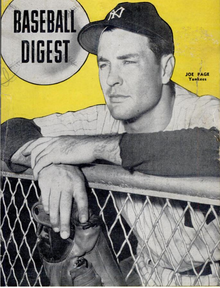Joe Page
| Joe Page | |||
|---|---|---|---|
 |
|||
| Pitcher | |||
|
Born: October 28, 1917 Cherry Valley, Pennsylvania |
|||
|
Died: April 21, 1980 (aged 62) Latrobe, Pennsylvania |
|||
|
|||
| MLB debut | |||
| April 19, 1944, for the New York Yankees | |||
| Last MLB appearance | |||
| May 25, 1954, for the Pittsburgh Pirates | |||
| MLB statistics | |||
| Win–loss record | 57–49 | ||
| Earned run average | 3.53 | ||
| Strikeouts | 519 | ||
| Saves | 76 | ||
| Teams | |||
| Career highlights and awards | |||
Joseph Francis Page (October 28, 1917 – April 21, 1980), nicknamed Fireman and The Gay Reliever, was a Major League Baseball relief pitcher. Page, who was left-handed, played with the New York Yankees from 1944 to 1950 and with the Pittsburgh Pirates in 1954.
Page was signed by the New York Yankees as an amateur free agent in 1940. After spending time in the Yankees farm system, Page made his Major League Baseball debut on April 19, 1944 where he began his career as a starter.
In his rookie season (starting 16 games, and relieving in three others), Page was voted to play in the All-Star Game and ended his season with over 100 innings pitched and a 4.56 ERA. The next season, Page suffered a shoulder injury, which led him to start only nine of the twenty games he pitched. That season, Page improved his ERA to 2.82, along with a 6–3 record.
In 1946, Page split his time between closing and starting games, and he picked up three saves while posting a 3.57 ERA and a 9–8 record. In 1947, Page spent practically the whole season in the bullpen and only started twice. He was voted to play in the All-Star Game once again, because of his 2.48 ERA and a 14–8 record. He also led the American League with 17 saves this season. (Note that the save statistic was not an official baseball statistic until 1969, and had not even entered common usage until well after Page did this; this feat is something that is only retroactively appreciated. However, it was certainly appreciated at the time that Page played a greater than average role as the Yankees relief pitcher, at a time when there was no generally acknowledged "closing pitcher" role in baseball, and when starting pitchers were more often expected to finish complete games.)
...
Wikipedia
